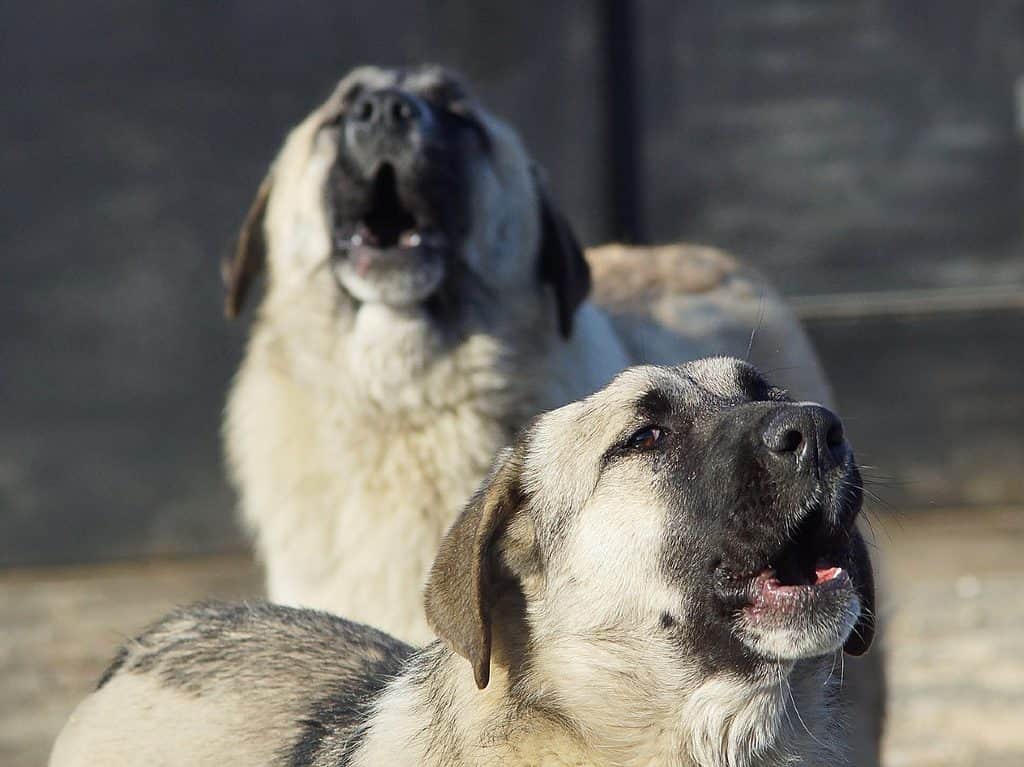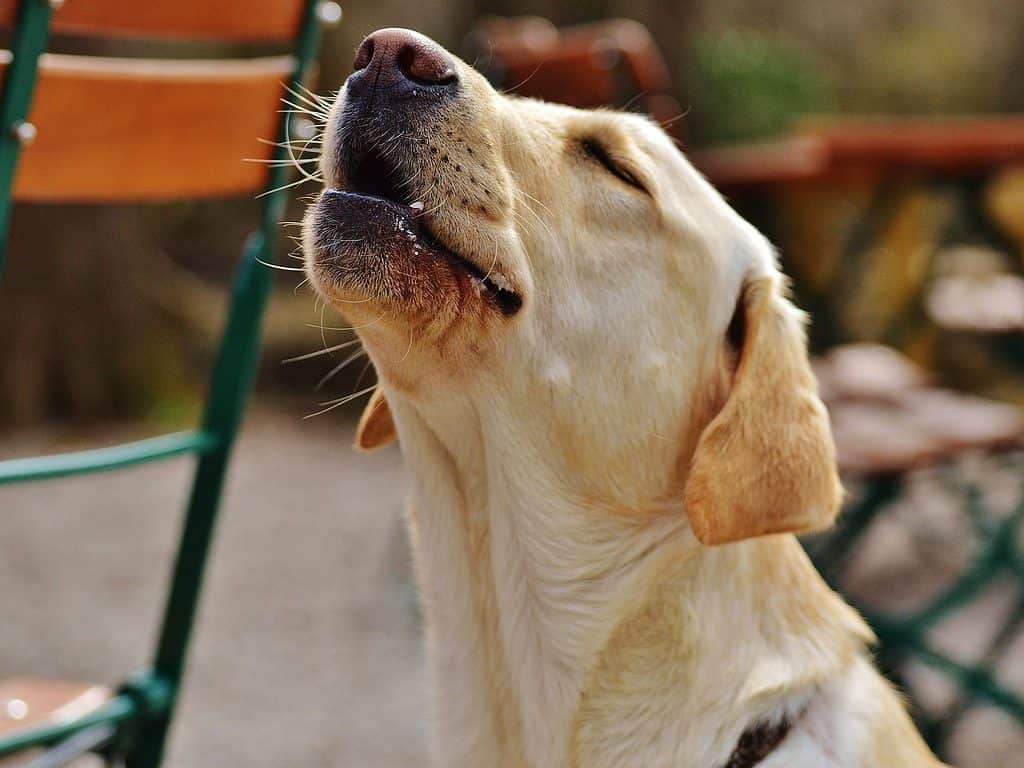Have you ever howled at your dog, only to be met with a perfectly harmonious howling echo? It’s an endearing sight, the bond between you and your pup brought to life through sound.
Now you ask yourself: Why does my dog howl when I howl?
This article explores five reasons why your pup may be joining in when you howl. From anticipation to instinct, the answer might surprise you.

Reason 1: Your dog howls in anticipation
When it comes to dog behavior, anticipation can be a powerful motivator.
Dogs are creatures of habit and respond positively when they know what’s coming next. They learn to associate certain sounds or activities with positive experiences, such as car rides or treats. So, when they hear you start a familiar sound like a howl, they know that something is exciting coming up and want to join in the fun.
Reason 2: Your dog is talking to you
Just like humans, dogs can use different sounds to express themselves. So when you let loose a loud howl, they might respond with one of their own. It could signify that your pup is happy to see or spend time with you.
Reason 3: Your dog is imitating you
Or it could be a simple case of mimicry. Just like humans learn from each other by copying one another, dogs may do the same with their owners. They may hear a sound from their beloved owners and instinctively decide to repeat it.
Reason 4: Your dog wants your attention
When your dog howls, it can signify that he is trying to get your attention. He’s not just trying to imitate you; she may actually be attempting to communicate with you.
Dogs have been domesticated for centuries, and they evolved to understand us. So when your pup hears you howling, her brain immediately connects it back to the human language. She knows that if she also joins in with a howl, then there’s a chance that you will give her the attention she craves.
Reason 5: You trigger your dog’s instinct to howl (wolf ancestry)
Did you know that your dog’s howling may be partially a result of their wolf ancestry?
It’s no secret that dogs have their roots in wolves, but did you know your pup might be carrying around some ancient wolf-like instincts?
When we make a sound similar to what a wolf would make, our furry friends pick up on it and show us their appreciation with joyful yips or long rounds of howling. Not only does this bonding moment bring joy for both owner and pup, but it can also provide an insight into the past behaviors of dogs’ wild relatives.
My Dog Doesn’t Howl When I Howl: What To Do?
Are you frustrated that your dog won’t howl along with you? Does it feel like no matter how hard you try, your pup isn’t getting the memo?
There can be several reasons your pup isn’t joining in on the serenade. For one, every dog is different, and some breeds aren’t big fans of howling. Breeds such as Bulldogs and Pugs don’t usually have the vocal chords necessary for their deep barks to turn into long, drawn-out melodies. So if your pup falls into this category, you may have to accept that they’re more of a barker than a howler.
Additionally, it could just be that your pup hasn’t learned the behavior yet; if they’re young or haven’t had much exposure to other dogs or wolf-like sounds, they might not even understand it as something they should do.
Another reason could be a lack of recognition. Dogs may not always recognize their owners’ attempts at vocal mimicry due to the differences in sound quality between humans and canines. So while you think you’re providing an accurate imitation, your pup might just think you’re making funny noises.
If you are still looking for a dog but look forward to one that would take part in a howling session, go for dog breeds that are more likely to howl than others. These include: American English Coonhound, Redbone Coonhound, Alaskan Malamutes, Siberian Husky, Bloodhound, Dachshund, and Beagle.
Tips To Getting A Dog To Howl Back

As mentioned, it’s possible that your dog doesn’t howl back at you because they don’t know how or have never heard you do it before. Here are some tips to help get your pooch singing along with you.
First and foremost, look at their environment; any loud noises or distractions could be causing them to stay mum. Make sure their home is a calm and quiet place so they can focus without disruptions.
Also, make sure that nothing is physically wrong with your pup. They won’t feel much like singing if they’re injured or ill. Once their health has been checked out and given the all-clear, it’s time to try playing music or recordings of other dogs howling.
Alternatively, start slowly by making small noises to get their attention, like using your tongue to make clicking sounds or gentle whining noises with different pitches. This will help them become more comfortable with vocalizing back at you.
Once they seem more receptive, increase the intensity of your howls until they begin participating alongside you.
Give your pup treats or toys as encouragement every time they attempt howling, so they know that joining in gets rewarded.
My Dog Howls All Night: How To Curb This Behavior
If your pup’s howling gets excessive or too loud for comfort, there are ways to curb this behavior.
Figure out why they’re doing it. Are they lonely? Bored? Anxious? In pain? Anxiety and pain could be the culprit of why your dog has been excessively howling. Understanding why it’s happening can help you find an effective solution.
The second step involves developing an action plan; this should include ways to distract your pup from howling. Interactive toys like balls and chew toys are a great distraction that might keep your pup occupied and eventually cease their howling.
Likewise, creating an environment conducive to rest and relaxation can help. This could mean providing your dog comfortable bedding in a quiet space with little stimulation.
Ultimately, ensure that your dog gets plenty of exercise during the day; a tired dog tends to be quiet.
References
Su, S. Vocal Communication in the Domestic Dog.
Childs, N. B. (2004). Shaping the Wolf Within Your Dog. Trafford Publishing.




